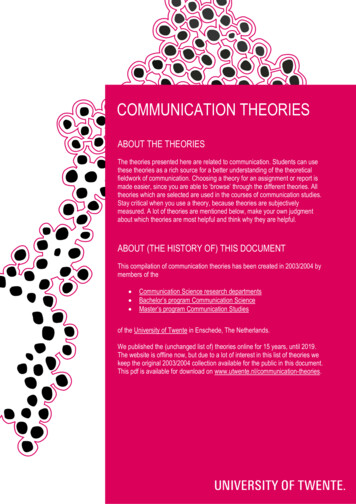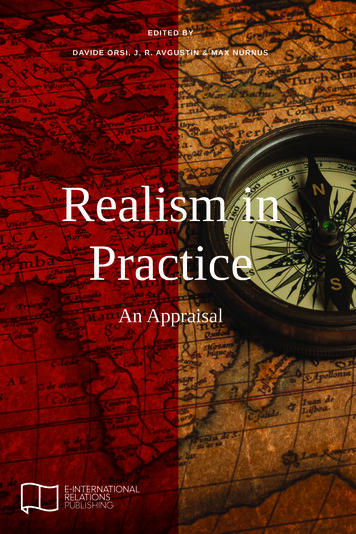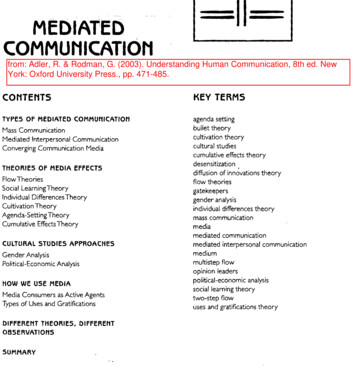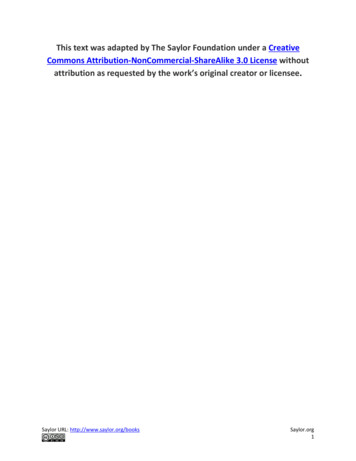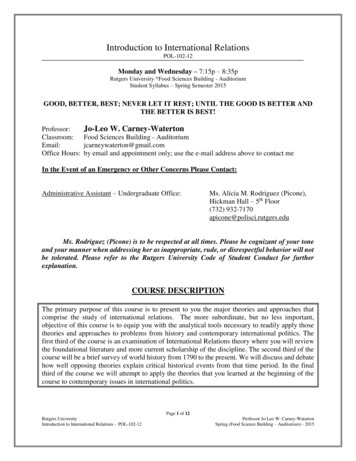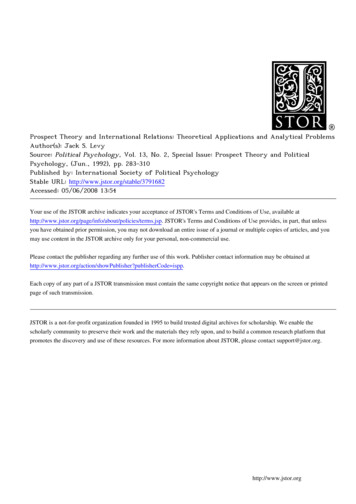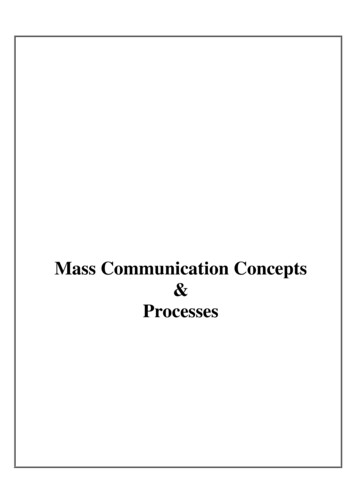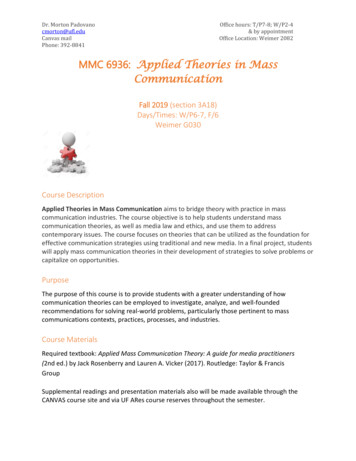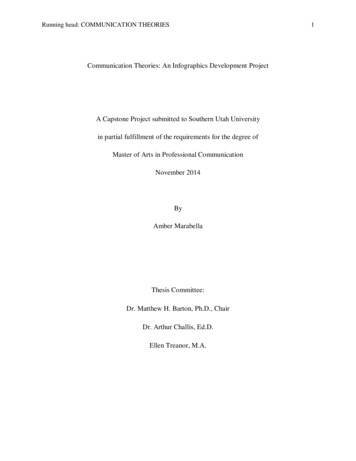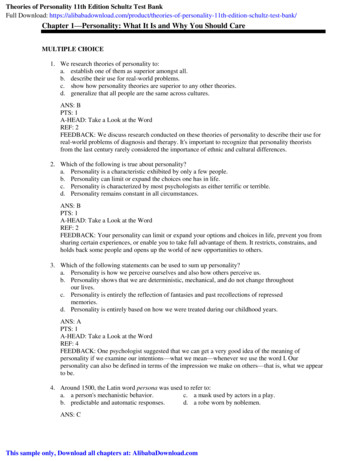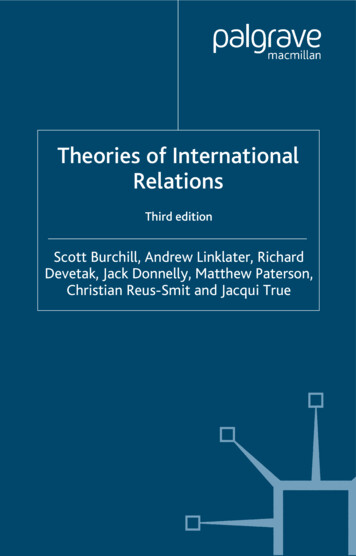
Transcription
Theories of InternationalRelationsThird editionScott Burchill, Andrew Linklater, RichardDevetak, Jack Donnelly, Matthew Paterson,Christian Reus-Smit and Jacqui True
Theories of International Relations
This page intentionally left blank
Theories ofInternationalRelationsThird editionScott Burchill, Andrew Linklater,Richard Devetak, Jack Donnelly,Matthew Paterson, ChristianReus-Smit and Jacqui True
Material from 1st edition Deakin University 1995, 1996Chapter 1 Scott Burchill 2001, Scott Burchill and Andrew Linklater 2005Chapter 2 Jack Donnelly 2005Chapter 3 Scott Burchill, Chapters 4 and 5 Andrew Linklater,Chapters 6 and 7 Richard Devetak, Chapter 8 Christian Reus-Smit,Chapter 9 Jacqui True, Chapter 10 Matthew Paterson 2001, 2005All rights reserved. No reproduction, copy or transmission of thispublication may be made without written permission.No paragraph of this publication may be reproduced, copied or transmittedsave with written permission or in accordance with the provisions of theCopyright, Designs and Patents Act 1988, or under the terms of any licencepermitting limited copying issued by the Copyright Licensing Agency, 90Tottenham Court Road, London W1T 4LP.Any person who does any unauthorized act in relation to this publicationmay be liable to criminal prosecution and civil claims for damages.The authors have asserted their rights to be identifiedas the authors of this work in accordance with the Copyright,Designs and Patents Act 1988.First edition 1996Second edition 2001Published 2005 byPALGRAVE MACMILLANHoundmills, Basingstoke, Hampshire RG21 6XS and175 Fifth Avenue, New York, N.Y. 10010Companies and representatives throughout the world.PALGRAVE MACMILLAN is the global academic imprint of the PalgraveMacmillan division of St. Martin’s Press, LLC and of Palgrave Macmillan Ltd.Macmillan is a registered trademark in the United States, United Kingdomand other countries. Palgrave is a registered trademark in the EuropeanUnion and other countries.ISBN-13: 978–1–4039–4865–6 hardbackISBN-10: 1–4039–4865–8 hardbackISBN-13: 978–1–4039–4866–3 paperbackISBN-10: 1–4039–4866–6 paperbackThis book is printed on paper suitable for recycling and made from fullymanaged and sustained forest sources.A catalogue record for this book is available from the British Library.Library of Congress Cataloging-in-Publication DataTheories of international relations / Scott Burchill [et al.]. – 3rd ed.p. cm.Includes bibliographical references and index.ISBN-13: 978–1–4039–4865–6 (cloth)ISBN-10: 1–4039–4865–8 (cloth)ISBN-13: 978–1–4039–4866–3 (pbk.)ISBN-10: 1–4039–4866–6 (pbk.)1. International relations – Philosophy. I. Burchill, Scott, 1961–JZ1242.T48 2005327.1 01—dc2210 9 8 7 6 5 4 3 2 114 13 12 11 10 09 08 07 06 05Printed in China2005043737
ContentsPreface to the Third EditionviiiList of AbbreviationsixNotes on the Contributorsx11IntroductionScott Burchill and Andrew LinklaterFrameworks of analysisDiversity of theoryContested natureThe foundation of International RelationsTheories and disciplinesExplanatory and constitutive theoryWhat do theories of international relationsdiffer about?Evaluating theories2312569151823RealismJack Donnelly29Defining realismHobbes and classical realismWaltz and structural realismMotives matterProcess, institutions and changeMorality and foreign policyHow to think about realism (and its critics)30323440444852LiberalismScott Burchill55After the Cold WarLiberal internationalism: ‘inside looking out’War, democracy and free tradeEconomy and terrorismConclusion5557587081v
viContents4The English SchoolAndrew Linklater84From power to order: international societyOrder and justice in international relationsThe revolt against the West and the expansion ofinternational societyProgress in international relationsConclusion89935MarxismAndrew LinklaterClass, production and international relations inMarx’s writingsNationalism and imperialismThe changing fortunes of Marxism inInternational RelationsMarxism and international relations theory al TheoryRichard Devetak137Origins of critical theoryThe politics of knowledge in International Relations theoryRethinking political d Devetak161Power and knowledge in International RelationsTextual strategies of postmodernismProblematizing sovereign statesBeyond the paradigm of sovereignty: rethinking the ristian Reus-Smit188Rationalist theoryThe challenge of critical theoryConstructivism189193194
Contents9viiConstructivism and its discontentsThe contribution of constructivismConstructivism after 9/11Conclusion201205207211FeminismJacqui True213Empirical feminismAnalytical feminismNormative feminismConclusion21622122823210 Green PoliticsMatthew PatersonGreen political theoryGlobal ecologyEcocentrismLimits to growth, post-developmentGreen rejections of the state-systemObjections to Green arguments for decentralizationGreening global liography258Index289
Preface to the Third EditionLike its predecessors, the third edition is intended to provide upper-levelundergraduates and postgraduates with a guide to the leading theoreticalperspectives in the field.The origins of the project lie in the development by Deakin Universityof a distance-learning course in 1995: early versions of several chapterswere initially written for the course guide for this. The first edition ofthis book brought together substantially revised versions of these withnew chapters on Feminism and Green Politics. The second edition addeda further chapter on Constructivism. None of those involved in the project at the outset guessed that the result would be quite such a successfultext as this has turned out to be, with course adoptions literally all overthe world.The third edition has again been substantially improved. For thisedition, Jack Donnelly has written a new chapter on the varieties ofRealism. Jacqui True has produced what is virtually a new chapter onFeminism. Andrew Linklater’s chapter on the English School replacesthe one on Rationalism which he contributed to the first and secondeditions. All chapters, however, have been revised and updated to reflectdevelopments in the literature and to take account, where appropriate,of the significance of ‘9/11’ for theories of world politics. The thirdedition also includes a significantly revised introduction on the importance of international relations theory for students of world affairs.Last but not least, the whole book has been redesigned, consistencybetween chapters in style and presentation has been improved, and aconsolidated bibliography has been added with Harvard referencesreplacing notes throughout.As with the earlier editions, our publisher, Steven Kennedy has beenkeenly involved in every stage of the production of this book. We aregrateful once again for his unfailing commitment and wise counsel.Thanks also to Gary Smith of Deakin University and Dan Flitton fortheir contributions to earlier editions. Above all we would like to thankour co-authors for their hard work and forbearance.SCOTT BURCHILLANDREW LINKLATERviii
List of Asia Pacific Economic CooperationCampaign for Nuclear Disarmament (UK)Foreign direct investmentGender and developmentGreen political theoryInternational Criminal CourtInternational Court of JusticeInternational organizationInternational Labour OrganizationInternational Monetary FundInternational Political EconomyInternational Union for the Conservation of Nature andNatural ResourcesMAIMultilateral Agreement on InvestmentsMNCMultinational corporationNAFTA North American Free Trade AgreementNATO North Atlantic Treaty OrganizationNGONon-governmental organizationNTBNon-trade barrierOECD Organization for Economic Cooperation and DevelopmentSAPStructural adjustment policy (IMF)TNCTransnational corporationUNCED United Nations Conference on Environment and DevelopmentUNDPUnited Nations Development ProgrammeWCED World Commission on Environment and DevelopmentWHOWorld Health OrganizationWMDWeapons of mass destructionWTOWorld Trade OrganizationWIDWomen in international developmentix
Notes on the ContributorsScott Burchill is Senior Lecturer in International Relations, DeakinUniversity, Australia.Richard Devetak is Lecturer in Politics, Monash University, Australia.Jack Donnelly is Andrew W. Mellon Professor of Political Science,University of Denver, USA.Andrew Linklater is Woodrow Wilson Professor of InternationalPolitics, University of Wales, Aberystwyth, UK.Matthew Paterson is Associate Professor of Political Science, Universityof Ottawa, Canada.Christian Reus-Smit is Professor of International Relations, AustralianNational University, Australia.Jacqui True is Lecturer in International Politics, University of Auckland,New Zealand.x
Chapter 1IntroductionSCOTT BURCHILL AND ANDREW LINKLATERFrameworks of analysisThe study of international relations began as a theoretical discipline.Two of the foundational texts in the field, E. H. Carr’s, The Twenty Years’Crisis (first published in 1939) and Hans Morgenthau’s Politics AmongNations (first published in 1948) were works of theory in three centralrespects. Each developed a broad framework of analysis which distilledthe essence of international politics from disparate events; each soughtto provide future analysts with the theoretical tools for understandinggeneral patterns underlying seemingly unique episodes; and each reflectedon the forms of political action which were most appropriate in a realmin which the struggle for power was pre-eminent. Both thinkers weremotivated by the desire to correct what they saw as deep misunderstandings about the nature of international politics lying at the heart ofthe liberal project – among them the belief that the struggle for powercould be tamed by international law and the idea that the pursuit of selfinterest could be replaced by the shared objective of promoting securityfor all. Not that Morgenthau and Carr thought the international political system was condemned for all time to revolve around the relentlessstruggle for power and security. Their main claim was that all efforts toreform the international system which ignored the struggle for powerwould quickly end in failure. More worrying in their view was the danger that attempts to bring about fundamental change would compoundthe problem of international relations. They maintained the liberal internationalist world-view had been largely responsible for the crisis of theinter-war years.Many scholars, particularly in United States in the 1960s, believedthat Morgenthau’s theoretical framework was too impressionistic innature. Historical illustrations had been used to support rather thandemonstrate ingenious conjectures about general patterns of internationalrelations. In consequence, the discipline lagged significantly behind thestudy of Economics which used a sophisticated methodology drawnfrom the natural sciences to test specific hypotheses, develop general1
2Introductionlaws and predict human behaviour. Proponents of the scientific approachattempted to build a new theory of international politics, some for thesake of better explanation and higher levels of predictive accuracy, othersin the belief that science held the key to understanding how to transforminternational politics for the better.The scientific turn led to a major disciplinary debate in the 1960s inwhich scholars such as Hedley Bull (1966b) argued that internationalpolitics were not susceptible to scientific enquiry. This is a view widelyshared by analysts committed to diverse intellectual projects. The radicalscholar, Noam Chomsky (1994: 120) has claimed that in internationalrelations ‘historical conditions are too varied and complex for anythingthat might plausibly be called “a theory” to apply uniformly’ (1994:120). What is generally know as ‘post-positivism’ in InternationalRelations rejects the possibility of a science of international relationswhich uses standards of proof associated with the physical sciences todevelop equivalent levels of explanatory precision and predictivecertainty (Smith, Booth and Zalewski 1996). In the 1990s, a majordebate occurred around the claims of positivism. The question ofwhether there is a world of difference between the ‘physical’ and the‘social’ sciences was a crucial issue, but no less important were disputesabout the nature and purpose of theory. The debate centred on whethertheories – even those that aim for objectivity – are ultimately ‘political’because they generate views of the world which favour some politicalinterests and disadvantage others. This dispute has produced verydifficult questions about what theory is and what its purposes are. Thesequestions are now central to the discipline – more central than at anyother time in its history. What, in consequence, is it to speak of a ‘theoryof international politics?Diversity of theoryOne purpose of this volume is to analyse the diversity of conceptions oftheory in the study of international relations. Positivist or ‘scientific’approaches remain crucial, and are indeed dominant in the UnitedStates, as the success of rational choice analysis demonstrates. But this isnot the only type of theory available in the field. An increasingly largenumber of theorists are concerned with a second category of theory inwhich the way that observers construct their images of internationalrelations, the methods they use to try to understand this realm and thesocial and political implications of their ‘knowledge claims’ are leadingpreoccupations. They believe it is just as important to focus on how we
Scott Burchill and Andrew Linklater3approach the study of world politics as it is to try to explain globalphenomena. In other words the very process of theorizing itself becomesa vital object of inquiry.Steve Smith (1995: 26–7) has argued that there is a fundamental divisionwithin the discipline ‘between theories which seek to offer explanatory(our emphasis) accounts of International Relations’ and perspectiveswhich regard ‘theory as constitutive (our emphasis) of that reality’.Analysing these two conceptions of theory informs much of the discussionin this introductory chapter.The first point to make in this context is that constitutive theories havean increasingly prominent role in the study of international relations,but the importance of the themes they address has long been recognized.As early as the 1970s Hedley Bull (1973: 183–4) argued that:the reason we must be concerned with the theory as well as the historyof the subject is that all discussions of international politics proceed upon theoretical assumptions which we should acknowledgeand investigate rather than ignore or leave unchallenged. The enterprise of theoretical investigation is at its minimum one directedtowards criticism: towards identifying, formulating, refining, andquestioning the general assumptions on which the everyday discussion of international politics proceeds. At its maximum, the enterpriseis concerned with theoretical construction: with establishing thatcertain assumptions are true while others are false, certain argumentsvalid while others are invalid, and so proceeding to erect a firm structureof knowledge.This quotation reveals that Bull thought that explanatory and constitutive theory are both necessary in the study of international relations:intellectual enquiry would be incomplete without the effort to increaseunderstanding on both fronts. Although he wrote this in the early 1970s,it was not until later in the decade that constitutive theory began toenjoy a more central place in the discipline, in large part because of theinfluence of developments in the cognate fields of social and politicaltheory. In the years since, with the growth of interest in internationaltheory, a flourishing literature has been devoted to addressing theoretical concerns, much of it concerned with constitutive theory. This focuson the process of theorizing has not been uncontroversial. Some haveargued that the excessive preoccupation with theory represents a withdrawal from an analysis of ‘real-world’ issues and a sense of responsibility for policy relevance (Wallace 1996). There is a parallel here witha point that Keohane (1988) made against post-modernism which is
4Introductionthat the fixation with problems in the philosophy of social science leadsto a neglect of important fields of empirical research.Critics of this argument maintain that it rests on unspoken orundefended theoretical assumptions about the purposes of studyinginternational relations, and specifically on the belief that the disciplineshould be concerned with issues which are more vital to states than tocivil society actors aiming to change the international political system(Booth 1997; Smith 1997). Here it is important to recall that Carr andMorgenthau were interested not only in explaining the world ‘out there’but in making a powerful argument about what states could reasonablyhope to achieve in the competitive world of international politics. Smith(1996: 113) argues that all theories do this whether intentionally orunintentionally: they ‘do not simply explain or predict, they tell us whatpossibilities exist for human action and intervention; they define notmerely our explanatory possibilities, but also our ethical and practicalhorizons’.Smith questions what he sees as the false assumption that ‘theory’stands in opposition to ‘reality’ – conversely that ‘theory’ can be testedagainst a ‘reality’ which is already ‘out there’ (see also George 1994).The issue here is whether what is ‘out there’ is always theory-dependentand invariably conditioned to some degree by the language and cultureof the observer and by general beliefs about society tied to a particularplace and time. And as noted earlier, those who wonder about the pointof theory cannot avoid the fact that analysis is always theoreticallyinformed and likely to have political implications and consequences(Brown 2002). The growing feminist literature in the field discussed inChapter 9 has stressed this argument in its claim that many of its dominanttraditions are gendered in that they reflect specifically male experiencesof society and politics. Critical approaches to the discipline which arediscussed in Chapters 6 and 7 have been equally keen to stress that thereis, as Nagel (1986) has argued in a rather different context, ‘no viewfrom nowhere’.To be fair, many exponents of the scientific approach recognized thisvery problem, but they believed that science made it possible for analyststo rise above the social and political world they were investigating. Whatthe physical sciences had achieved could be emulated in social-scientificforms of enquiry. This is a matter to come back to later. But debatesabout the possibility of a science of international relations, and disputesabout whether there has been an excessive preoccupation with theory inrecent years, demonstrate that scholars do not agree about the natureand purposes of theory or concur about its proper place in the widerfield. International Relations is a discipline of theoretical disagreements –a ‘divided discipline’, as Holsti (1985) called it.
Scott Burchill and Andrew Linklater5Contested natureIndeed it has been so since those who developed this comparatively newsubject in the Western academy in the aftermath of the First World Warfirst debated the essential features of international politics. Ever sincethen, but more keenly in some periods than in others, almost everyaspect of the study of international politics has been contested. Whatshould the discipline aim to study: Relations between states? Growingtransnational economic ties, as recommended by early twentieth-centuryliberals? Increasing international interdependence, as advocated in the1970s? The global system of dominance and dependence, as claimed byMarxists and neo-Marxists from the 1970s? Globalization, as scholarshave argued in more recent times? These are some examples of how thediscipline has been divided on the very basic question of its subjectmatter.How, in addition, should international political phenomena be studied:by using empirical data to identify laws and patterns of internationalrelations? By using historical evidence to understand what is unique(Bull 1966a) or to identify some traditions of thought which have survivedfor centuries (Wight 1991)? By using Marxist approaches to production,class and material inequalities? By emulating, as Waltz (1979) does, thestudy of the market behaviour of firms to understand systemic forceswhich make all states behave in much the same way? By claiming, asWendt (1999) does in his defence of constructivism, that in the study ofinternational relations it is important to understand that ‘it is ideas all theway down?’ These are some illustrations of fundamental differences aboutthe appropriate methodology or methodologies to use in the field.Finally is it possible for scholars to provide neutral forms of analysis,or are all approaches culture-bound and necessarily biased? Is it possibleto have objective knowledge of facts but not of values, as advocates ofthe scientific approach argued? Or, as some students of global ethicshave argued, is it possible to have knowledge of the goals that states andother political actors should aim to realize such as the promotion ofglobal justice (Beitz 1979) or ending world poverty (Pogge 2002) Theseare some of the epistemological debates in the field, debates about whathuman beings can and cannot know about the social and politicalworld. Many of the ‘great debates’ and watersheds in the discipline havefocused on such questions.In the remainder of this introductory chapter we will examine theseand other issues under the following headings: The foundation of the discipline of International RelationsTheories and disciplines
6 IntroductionExplanatory and constitutive theoryWhat do theories of international relations differ about?What criteria exist for evaluating theories?One of our aims is to explain the proliferation of theories since the1980s, to analyse their different ‘styles’ and methods of proceeding andto comment on a recurrent problem in the field which is that theoristsoften appear to ‘talk past’ each other rather than engage in productivedialogue. Another aim is to identify ways in which meaningful comparisons between different perspectives of International Relations can bemade. It will be useful to bear these points in mind when reading laterchapters on several influential theoretical traditions in the field. Webegin, however, with a brief introduction to the development of thediscipline.The foundation of International RelationsAlthough historians, international lawyers and political philosophershave written about international politics for many centuries, the formalrecognition of a separate discipline of International Relations is usuallythought to have occurred at the end of the First World War with the establishment of a Chair of International Relations at the University of Wales,Aberystwyth. Other Chairs followed in Britain and the United States.International relations were studied before 1919, but there was nodiscipline as such. Its subject matter was shared by a number of olderdisciplines, including law, philosophy, economics, politics and diplomatichistory – but before 1919 the subject was not studied with the greatsense of urgency which was the product of the First World War.It is impossible to separate the foundation of the discipline ofInternational Relations from the larger public reaction to the horrors ofthe ‘Great War’, as it was initially called. For many historians of the time,the intellectual question which eclipsed all others and monopolized theirinterest was the puzzle of how and why the war began. Gooch in England,Fay and Schmitt in the United States, Renouvin and Camille Bloch inFrance, Thimme, Brandenburg and von Wegerer in Germany, Pribram inAustria and Pokrovsky in Russia deserve to be mentioned in this regard(Taylor 1961: 30). They had the same moral purpose, which was todiscover the causes of the First World War so that future generations mightbe spared a similar catastrophe.The human cost of the 1914–18 war led many to argue that the oldassumptions and prescriptions of power politics were totally discredited.Thinkers such as Sir Alfred Zimmern and Philip Noel-Baker came to
Scott Burchill and Andrew Linklater7prominence in the immediate post-war years. They believed that peacewould come about only if the classical balance of power were replacedby a system of collective security (including the idea of the rule of law)in which states transferred domestic concepts and practices to the international sphere. Central here was a commitment to the nineteenth-centurybelief that humankind could make political progress by using reasoneddebate to develop common interests. This was a view shared by manyliberal internationalists, later dubbed ‘idealists’ or ‘utopians’ by criticswho thought their panaceas were simplistic. Carr (1939/1945/1946)maintained that their proposed solution to the scourge of war sufferedfrom the major problem of reflecting, albeit unwittingly, the position ofthe satisfied powers – ‘the haves’ as opposed to the ‘have-nots’ ininternational relations. It is interesting to note that the first complaintabout the ideological and political character of such a way of thinkingabout international politics was first made by a ‘realist’ such as Carrwho was influenced by Marxism and its critique of the ideologicalnature of the dominant liberal approaches to politics and economics inthe nineteenth century. Carr thought that the same criticism held withrespect to the ‘utopians’, as he called them.The war shook the confidence of those who had invested their faith inclassical diplomacy and who thought the use of force was necessary attimes to maintain the balance of power. At the outbreak of the First WorldWar few thought it would last more than a few months and fewer stillanticipated the scale of the impending catastrophe. Concerns about thehuman cost of war were linked with the widespread notion that the oldinternational order, with its secret diplomacy and secret treaties, wasplainly immoral. The belief in the need for a ‘clean break’ with the oldorder encouraged the view that the study of history was an imperfectguide to how states should behave in future. In the aftermath of the war,a new academic discipline was thought essential, one devoted to understanding and preventing international conflict. The first scholars in thefield, working within universities in the victorious countries, and particularly in Britain and the United States, were generally agreed that thefollowing three questions should guide their new field of inquiry:1. What were the main causes of the First World War, and what was itabout the old order that led national governments into a war whichresulted in misery for millions?2. What were the main lessons that could be learned from the First WorldWar? How could the recurrence of a war of this kind be prevented?3. On what basis could a new international order be created, and howcould international institutions, and particularly the League ofNations, ensure that states complied with its defining principles?
8IntroductionIn response to these questions, many members of the first ‘school’ or‘theory’ of international relations maintained that war was partly theresult of ‘international anarchy’ and partly the result of misunderstandings, miscalculations and recklessness on the part of politicians who hadlost control of events in 1914. The ‘idealists’ argued that a more peaceful world order could be created by making foreign policy elites accountable to public opinion and by democratizing international relations(Long and Wilson 1995; see also Chapter 2 in this volume). Accordingto Bull (quoted in Hollis and Smith 1990: 20):the distinctive characteristic of these writers was their belief in progress:the belief, in particular, that the system of international relations thathad given rise to the First World War was capable of being transformedinto a fundamentally more peaceful and just world order; that under theimpact of the awakening of democracy, the growth of the ‘internationalmind’, the development of the League of Nations, the good works ofmen of peace or the enlightenment spread by their own teachings, itwas in fact being transformed; and that their responsibility as studentsof international relations was to assist this march of progress to overcome the ignorance, the prejudices, the ill-will, and the sinister intereststhat stood in its way.Bull brings out the extent to which normative vision animated the discipline in its first phase of development when many thought the FirstWorld War was the ‘war to end all wars’. Only the rigorous study of thephenomenon of war could explain how states could create a world orderin which the recurrence of such a conflict would be impossible. Crucially,then, the discipline was born in an era when many believed that thereform of international politics was not only essential but clearly achievable. Whether or not the global order can be radically improved has beena central question in the study of international relations ever since.The critics’ reaction to this liberal internationalism dominated thediscipline’s early years. Carr (1939/1945/1946: Chapter 1), who wasone of the more scathing of them, maintained that ‘utopians’ were guiltyof ‘naivety’ and ‘exuberance’. Visionary zeal stood in the way of dispassionate analysis. The realist critique of liberal internationalism launchedby Carr immediately before the Second World War, and continued byvarious scholars including Morgent
ISBN-13: 978-1-4039-4865-6 hardback ISBN-10: 1-4039-4865-8 hardback ISBN-13: 978-1-4039-4866-3 paperback ISBN-10: 1-4039-4866-6 paperback This book is printed on paper suitable for recycling and made from fully managed and sustained forest sources. A catalogue record for this book is available from the British Library.
